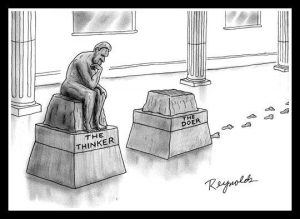
All the time people tell me how hard it can be to change.
It’s so true. Many of us strongly resist changing our brand of shampoo or toothpaste, let alone anything that truly matters in life.
Change can be hard to make because near everything we do is habitual, but there are also ways that we make change harder on ourselves… which are easy to change.
Ironically, in the world of personal development, one way is to stop making change so personal.
Who Is The “I?”
“I’m” just not any good at this?
“I’ve” always been this way.
“I” know that I need to change, and “I’m” really trying hard…
While it’s of course natural for us to conduct ourselves in first person, whenever we use a derivative of the pronoun “I,” we’ve made it personal, and this can make it infinitely harder to change.
Instead of simply changing a behavior—such as getting angry—or an attribute—such as our hair color—now it’s about us and how we’re a flawed little “I.”
And because that “I” inside each of us hates to be diminished, let alone told it is inferior in some way, when confronted it’s far more likely to get insecure, resistant, defensive than it is to embrace even its own desire to change.
See Yourself As A Doer
If you grab a kid by the collar and give them a “good talking to,” scolding them for their bad performance and rattling off all the ways that they can improve, how would you expect them to respond?
Most kids would get upset, or defensive, and even that subservient kid who dutifully does what you say will likely resent you over time.
A smart parent knows that approach fails, yet we often fail to see that it also fails with ourselves.
While we might learn to talk to a kid gently and use stories and other devices to lead them in the right direction, we tend to be more direct with ourselves which triggers our insecurities and defenses, and makes it harder for us to change.
A better way is to see “you” as separate from your attributes/behaviors, by seeing yourself as a doer.
Upgrade The Doer
When I use the phrase “Doer,” I’m suggesting seeing your twin roles as both Doer and Perceiver.
Reading this article you are a Doer reading, and you’re also a Perceiver, observing yourself reading. As the Doer you might be judging what you’re reading, thinking about whether it makes sense, and as the Perceiver, you are aware of you reading and making those judgements.
In all tasks we are both manager and worker, leader and follower, and in “dissociating” from our role as the Doer, we make it easier to lead ourselves to improve.
If your goal is to be a scratch golfer, you can walk the course all day cussing “yourself” for every mistake, or you can simply evaluate each of your swings according to your goal.
Most certainly, “you” as the Doer are the one swinging the club, but as the Perceiver you can also make it impersonal, and objectively evaluate each of those swings.
What was that tee shot out of ten? Was it a six? A seven? What would “I” need to adjust to get “that” swing to an 8?
Do you see how different that might feel compared to—F**k (while slamming the club), I always keep slicing the ball into the trees.
Beating ourselves down for our mistakes rarely leads to picking up our performance, but when we can see our actions from a dissociated position we simply ask…
How Might You Take It Up A Notch?
Imagine me sitting at my desk with no idea how to write a book, worried about where all this might get to, looking at pages of crap telling myself “I really suck at this.”
That feels hard. And it sure as heck didn’t lead me to get more excited about sitting down to write.
But when I was able to step out of the personal criticism of my crap writing, I put myself in the right mindset to simply keep doing and improving my writing.
Instead of the Doer proclaiming, “I’m bad at this, I must get better,” the perceiving part of the mind is able to ask, “So, if we’re doing at level 6, what would need to change for us to do at level 7?”
Can you see how making it impersonal makes it much easier to help yourself and others change?
Learning To Ride A Bike
My buddy told me about the challenges of teaching his son to ride a bike, which constantly required picking him up physically and emotionally.
If left to his own devices, his son would say things like—I’m just not any good at this. I’m never going to be able to ride a bike. I just don’t have the balance.
Making it personal, getting down on himself for falling, he’s more likely to stop trying rather than to keep improving.
Yet when his Dad taught him to see that he was merely at Level 1, and that as he keeps peddling he upgrades to level 2, he gamified it, which helped him get through those hard parts to learning and made it much more fun too.
How Can You Use This?
Simply, right?
- What is something you want to improve at?
- Identify how you might have beaten yourself up for it in the past or avoided improving because you had made it personal.
- Rank your current performance out of ten.
- Identify those things that you would change to take it up a notch (or two or three).
- Love being and observing the Doer practicing and getting better!